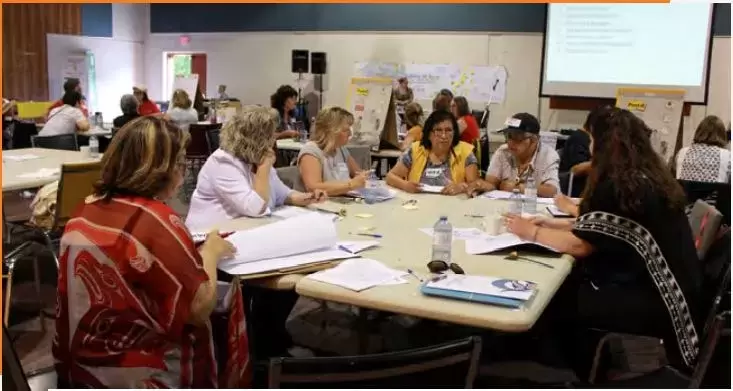A “culture shift” is needed at the West Coast General and other hospitals to better meet the emergency needs of Nuu-chah-nulth elders, according to a new report from the First Nations Health Authority.
With input from Island Health and a group of more than 60 individual participants, the Report on Recommendations for Trauma-Informed and Culturally Safe Emergency Care identifies discrimination in the health care system that Nuu-chah-nulth people rely upon. The report speaks of elders avoiding emergency care due to fear of being misunderstood – or of being triggered due to childhood experiences in the residential school system.
“I am a residential school survivor and the impact of residential schools has made a huge difference in how I relate to the medical profession at the hospital,” reads an account from Daisy Georgina Laing, one of the many Nuu-chah-nulth elders who contributed to the report, first over two days in 2017, then two years later for an update.
Laing noted being re-traumatized while at the hospital.
“When I talked about myself being held down over the top of a table, I thought I was going to be raped again,” she said in the FNHA document.
The report notes that many elders feel intimidated when entering the hospital, and that healthcare workers need to better understand how trauma affects access to emergency care. Hospital staff need to be “self reflexive about their level of cultural humility, which will further enable cultural safety,” states the document.
But in the age of the COVID-19 pandemic placing unprecedented demands on healthcare workers, requirements for professionals to take more time to understand the backgrounds of individual patients could prove challenging.
The shortage of doctors in the Alberni Valley is another issue that existed long before the pandemic. The College of Physicians and Surgeons of British Columbia lists 32 family doctors in the area of approximately 25,000 residents, averaging one physician for every 781 residents.
As the Nuu-chah-nulth Nursing Program’s health promotion worker, Matilda Atleo has been working with elders in need of medical care for years. She finds that the current state of the medical system discourages elders from having their concerns met.
“The way they talk about it is, their doctors don’t listen,” said Atleo. “They make accusations. There was an elderly couple, and the woman has had rheumatoid arthritis for years. [The doctor was] calling her a drug addict, telling her she just wants drugs.”
The FNHA report calls for mandatory “cultural safety and trauma-informed” training for all hospital staff, which promotes respect for First Nations spirituality. But Atleo cautions that a generalized education in sensitivities for Indigenous patients might be missing the specific history of the Alberni Valley.
“When it comes to the cultural safety, it should come from this area,” she said, noting that someone providing this training at West Coast General isn’t Nuu-chah-nulth. “One of the guys that’s doing it for Island Health isn’t even from around here…It’s more generalized.”
A full-time Aboriginal Liaison nurse works at West Coast General, but the FNHA report stresses the need for elders to have 24-hour access to people who can accompany and speak up for them when medical care is needed. The report notes that elders tend to be stoic with their health issues, and any expression of suffering could be an understatement.
“We need an advocate, we need someone that can actually just help these people when it comes to trying get medication,” said Atleo. “Our elders really need someone to be able to go in with them.”
But the report does note some improvements between the initial workshop in 2017 and the follow-up session in 2019. In November of that year the West Coast General opened the All Nations Room, a space where families can gather to share traditional healing practices and ceremonies, such as prayer and ritual cleansing. This development came from a 2014 recommendation by the hospital’s cultural safety committee.
“The All Nations Room will increase the representation of Nuu-chah-nulth people and culture in the physical environment of the West Coast General Hospital, and will support First Nations people to feel more at ease in the hospital setting,” stated Brennan MacDonald, FNHA’s executive director for Vancouver Island, when the room was officially opened.
Respect in the health care setting is the long-term hope for Tla-o-qui-aht elder Barney Williams, who served as a cultural advisor for the FNHA report. He spoke of the need to create an environment “so that I and my grandchildren can walk into a hospital anywhere and be treated like a human being, versus feeling less than.”
Atleo tries to bridge the gaps with the medical community by developing relationships of mutual understanding.
“My own personal approach is the more health professionals I know, I’m going to invite them to my house. I’m going to get them to learn about us, talk about some of the assumptions they have that aren’t really true,” she said. “My hope is that one health professional will talk to another health professional and say, ‘Gee, these First Nations have sure been through a lot’.”







